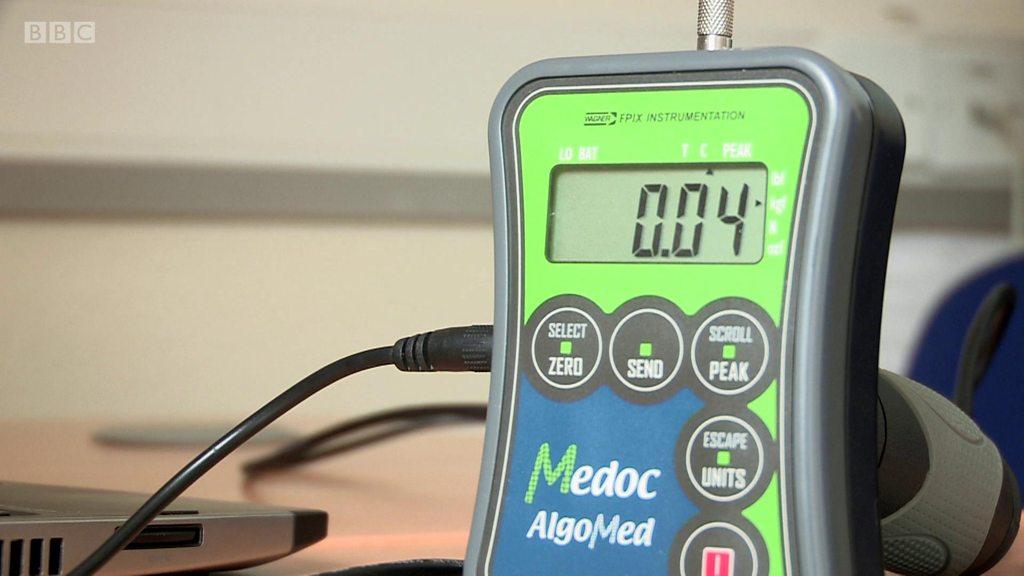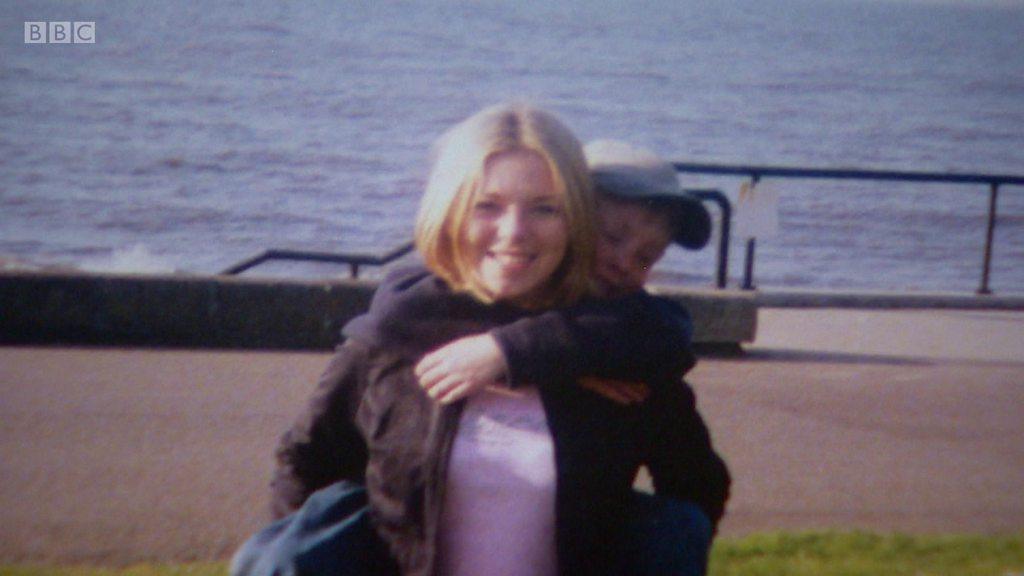People feeling suicidal have 'higher pain threshold'
- Published
The algometer measures a person’s physical pain threshold
People who attempt to take their own lives typically have a greater tolerance of physical pain, researchers at a specialist centre in Glasgow have discovered.
They say knowing that simple fact is helping them to come up with life-saving coping mechanisms.
The director of Scotland's only dedicated suicidal behaviour research laboratory is working with people in crisis to identify triggers and develop safety plans that could help the next time they are feeling suicidal.
The Suicidal Behaviour Research Lab at the University of Glasgow, external is led by Prof Rory O'Connor, who has been analysing the psychology of suicide and self-harm for 20 years.
He and his colleagues work with people in hospitals who have tried to take their own life.
The lab also conducts experimental research, such as assessing the physical pain sensitivity of people with suicidal histories.
The professor spoke to the BBC ahead of the Scottish government publishing its new suicide prevention strategy.
He said: "There are lots of factors associated with suicidal risk, but one might be people who attempt suicide or die by suicide have a higher capacity to withstand physical pain."
Prof O'Connor explained that people who are suicidal might be so overwhelmed with emotional pain they may be able to withstand a more physically painful suicide attempt.
In order to test this, an algometer - or pressure metre - is used by the team at the lab to measure a person's physical pain threshold.
By applying pressure to the palm of the hand and then inducing a negative mood, they can understand whether it affects their pain tolerance.
Gender factor
The most recent figures show that 728 people took their own life in Scotland during a 12 month period and of that number, 75% were men.
"It is absolutely devastating," Prof O'Connor said.
Although there are not any straight-forward answers to why the majority of people who take their own life are men, he believes it could be down to "how gender roles in society have changed in recent decades".
Prof O'Connor said: "It's a reality that men are less likely to seek help than women and use more lethal methods of suicide, so the likelihood of them dying, sadly, is elevated."
Staff at the research lab are working hard to change this, by piloting Europe's first "safety planning" intervention.
Safe environment
It involves three stages and is aimed at preventing people who have already tried to kill themselves from attempting suicide again.
Developed in the US and used by military veterans, it is now recommended as best practice by the Suicide Prevention Resource Centre.
Safety plans include a list of coping strategies, including;
identifying a trusted family member who can be contacted before or during a suicidal crisis
follow-up telephone calls during the critical intervening period between a person's discharge from hospital and waiting for care
keeping the environment "safe" so that when someone is suicidal they don't make the transition from thinking about suicide to attempting it.
Prof O'Connor believes providing a safe environment is "crucial" because of a lack of consistent aftercare in hospitals across Scotland.
The Scottish government will publish its suicide prevention action plan later, and promises to include improvements to mental health services and safety planning.
The new minister for mental health, Clare Haughey, said the Scottish government believed that "no death by suicide should be regarded as either acceptable or inevitable".
She added: "Over the past decade, Scotland has made real progress in reducing deaths by suicide but we have far more to do.
"We want a Scotland where suicide is preventable, and where anyone contemplating suicide or who has lost a loved one gets the support they need."
Meanwhile, the professor and his team at the lab will try to understand the psychology of the suicidal mind.
"If we can prevent just one tragedy, it is worthwhile," he says.
Details of organisations which offer advice and support are available at BBC Action Line or you can call for free, at any time, to hear recorded information 0800 066 066.
- Published9 August 2018

- Published8 August 2018

- Published8 August 2018
